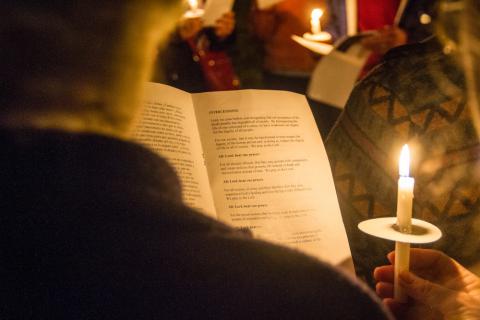
People take part in a candlelit vigil outside the Texas State Penitentiary at Huntsville during a scheduled execution Dec. 16, 2016. Catholic advocates applauded the Supreme Court for a ruling late Dec. 6, 2019, that leaves in place a preliminary injunction stopping the Trump administration's bid to resume federal executions. (CNS photo/Texas Catholic Herald/James Ramos)
The U.S. Supreme Court has left in place a preliminary injunction prohibiting the Trump administration from carrying out the first federal executions in 16 years.
In an order handed down the evening of Dec. 6, the justices unanimously denied an application by the U.S. Department of Justice to lift a federal court injunction blocking the federal government from carrying out four executions scheduled for December 2019 and January 2020.
In November, U.S. District Court Judge Tanya Chutkan of the District of Columbia temporarily halted the upcoming executions of four federal death-row inmates, who had challenged the constitutionality of the lethal injection protocol to be used in their executions.
When U.S. Attorney General William Barr announced in July that the government was reinstating the federal death penalty after a 16-year hiatus, he said the executions would use a single drug instead of a three-drug protocol used in recent federal executions and used by several states. Several of the inmates challenged the use of the single lethal injection.
Chutkan said these lethal injections go against the Federal Death Penalty Act of 1994, which states federal executions should be carried out "in the manner prescribed by the law of the state in which the sentence is imposed."
On Dec. 2, the U.S. Justice Department asked the Supreme Court to lift Chutkan's preliminary injunction.
The U.S. Supreme Court has left in place a preliminary injunction prohibiting the Trump administration from carrying out the first federal executions in 16 years.
In an order handed down the evening of Dec. 6, the justices unanimously denied an application by the U.S. Department of Justice to lift a federal court injunction blocking the federal government from carrying out four executions scheduled for December 2019 and January 2020.
In November, U.S. District Court Judge Tanya Chutkan of the District of Columbia temporarily halted the upcoming executions of four federal death-row inmates, who had challenged the constitutionality of the lethal injection protocol to be used in their executions.
When U.S. Attorney General William Barr announced in July that the government was reinstating the federal death penalty after a 16-year hiatus, he said the executions would use a single drug instead of a three-drug protocol used in recent federal executions and used by several states. Several of the inmates challenged the use of the single lethal injection.
Chutkan said these lethal injections go against the Federal Death Penalty Act of 1994, which states federal executions should be carried out "in the manner prescribed by the law of the state in which the sentence is imposed."
On Dec. 2, the U.S. Justice Department asked the Supreme Court to lift Chutkan's preliminary injunction.
Advertisement







